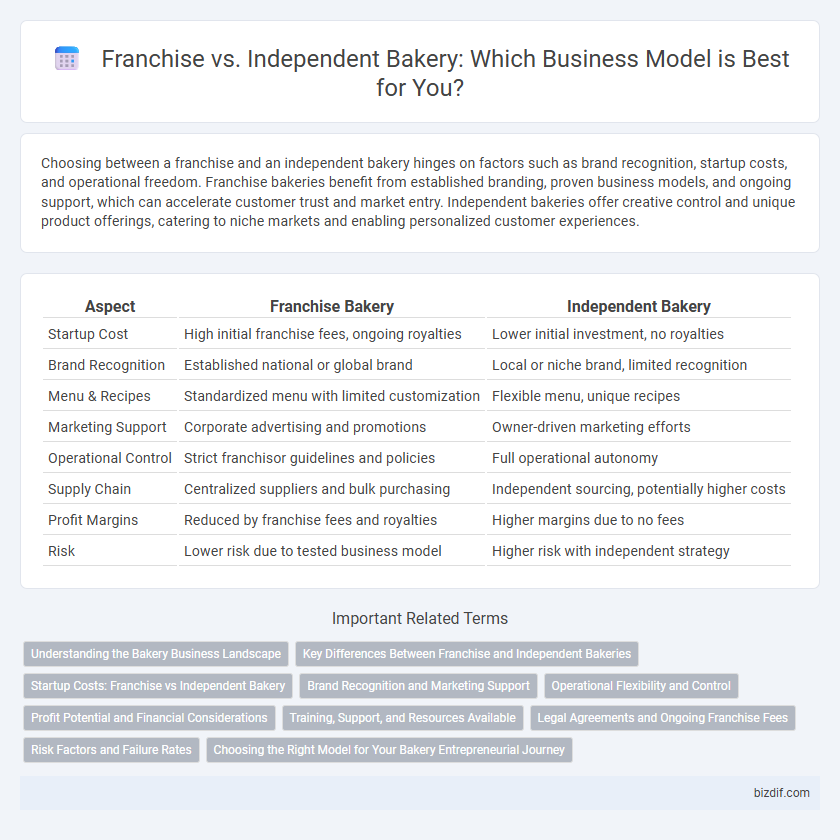Choosing between a franchise and an independent bakery hinges on factors such as brand recognition, startup costs, and operational freedom. Franchise bakeries benefit from established branding, proven business models, and ongoing support, which can accelerate customer trust and market entry. Independent bakeries offer creative control and unique product offerings, catering to niche markets and enabling personalized customer experiences.
Table of Comparison
| Aspect | Franchise Bakery | Independent Bakery |
|---|---|---|
| Startup Cost | High initial franchise fees, ongoing royalties | Lower initial investment, no royalties |
| Brand Recognition | Established national or global brand | Local or niche brand, limited recognition |
| Menu & Recipes | Standardized menu with limited customization | Flexible menu, unique recipes |
| Marketing Support | Corporate advertising and promotions | Owner-driven marketing efforts |
| Operational Control | Strict franchisor guidelines and policies | Full operational autonomy |
| Supply Chain | Centralized suppliers and bulk purchasing | Independent sourcing, potentially higher costs |
| Profit Margins | Reduced by franchise fees and royalties | Higher margins due to no fees |
| Risk | Lower risk due to tested business model | Higher risk with independent strategy |
Understanding the Bakery Business Landscape
Franchise bakeries benefit from established brand recognition, standardized operations, and comprehensive support systems that reduce startup risks and enhance marketing reach. Independent bakeries offer greater creative freedom, allowing bakers to innovate with unique recipes and tailor customer experiences to local preferences. Understanding the bakery business landscape requires evaluating factors such as initial investment, operational control, brand loyalty, and long-term growth potential to determine the best strategic fit.
Key Differences Between Franchise and Independent Bakeries
Franchise bakeries operate under a standardized brand with established recipes, marketing strategies, and supply chains, ensuring consistency across locations. Independent bakeries offer greater creative freedom, allowing unique product offerings and personalized customer experiences tailored to local tastes. Franchise models benefit from brand recognition and support networks, while independents rely on local reputation and flexibility for innovation.
Startup Costs: Franchise vs Independent Bakery
Startup costs for a franchise bakery typically include franchise fees, royalty payments, and expenses for standardized equipment and training programs, often ranging from $200,000 to $500,000. Independent bakery startups generally require lower initial investment, approximately $50,000 to $150,000, but may incur higher marketing and development costs due to building brand recognition from scratch. Franchise bakeries benefit from established brand equity and supplier agreements, while independents have more control over budget allocation and operational flexibility.
Brand Recognition and Marketing Support
Franchise bakeries benefit from established brand recognition, attracting customers through familiar logos, menus, and proven quality standards. They receive comprehensive marketing support, including national campaigns, promotional materials, and digital advertising strategies managed by the parent company. Independent bakeries often lack these resources, relying on local marketing efforts and word-of-mouth to build their customer base and brand identity.
Operational Flexibility and Control
Franchise bakeries offer standardized operational procedures and brand consistency but limit flexibility in product offerings and daily management decisions. Independent bakeries maintain full control over recipes, store layout, and customer experience, enabling rapid adaptation to local tastes and market changes. Operational flexibility in independents supports innovation, while franchises benefit from proven systems and corporate support.
Profit Potential and Financial Considerations
Franchise bakeries often benefit from established brand recognition and comprehensive support systems, which can lead to higher initial profit potential compared to independent bakeries. However, franchisees must navigate royalty fees and marketing costs that can impact overall profitability, whereas independent bakery owners retain full control and keep all profits but face higher risks and require strong local market knowledge. Evaluating startup costs, ongoing expenses, and profit margins is crucial for both models to determine financial viability and long-term sustainability.
Training, Support, and Resources Available
Franchise bakeries offer comprehensive training programs and ongoing support, ensuring consistent quality and operational standards across locations, backed by established systems and marketing resources. Independent bakeries rely heavily on owner expertise and self-driven learning, often facing challenges due to limited access to structured training and brand support. Resource availability in franchises typically includes supply chain benefits and technology platforms, while independents must source ingredients and tools individually, impacting scalability and efficiency.
Legal Agreements and Ongoing Franchise Fees
Franchise bakeries operate under strict legal agreements that outline brand standards, operational guidelines, and territorial rights, ensuring uniformity across locations. Independent bakeries enjoy full autonomy without ongoing franchise fees, allowing more flexibility but also assuming full responsibility for business risks and brand development. Ongoing franchise fees typically include initial royalties and advertising contributions, which can impact profitability compared to independently run bakeries.
Risk Factors and Failure Rates
Franchise bakeries benefit from established brand recognition and proven business models, reducing risk factors compared to independent bakeries, which often face higher failure rates due to limited market presence and operational challenges. Independent bakeries encounter significant financial risks, including unpredictable customer demand and higher marketing costs, contributing to their approximate 60% failure rate within the first five years. In contrast, franchise bakeries typically experience lower failure rates, averaging around 20%, supported by comprehensive training, supplier networks, and ongoing corporate support.
Choosing the Right Model for Your Bakery Entrepreneurial Journey
Franchise bakeries offer established brand recognition, proven business models, and support systems, making them ideal for entrepreneurs seeking lower risk and structured guidance. Independent bakeries provide creative freedom, flexible decision-making, and the ability to build a unique brand identity tailored to local tastes. Choosing the right model depends on your willingness to handle operational control versus the comfort of franchisor resources and market-tested strategies.
Franchise vs Independent Infographic

 bizdif.com
bizdif.com